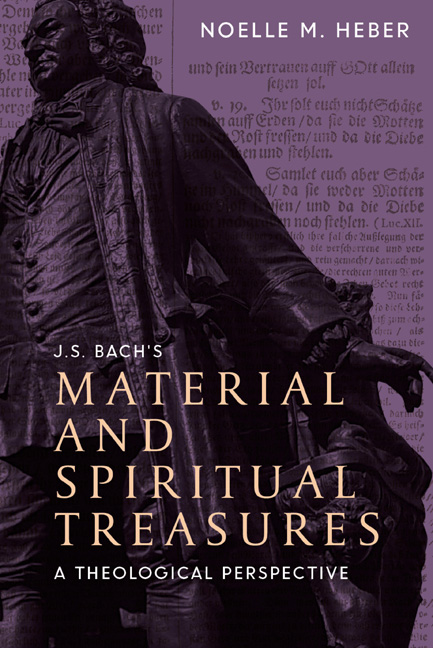Book contents
- Frontmatter
- Dedication
- Contents
- List of Illustrations
- List of Music Examples
- Foreword
- Preface
- List of Abbreviations
- Introduction
- 1 Bach’s Material Treasures: Career, Salary, and Freelancing
- 2 The Servant Prince: Poverty of Christ: Three Days of Christmas (BWV 91, 197a, 248/I, 121, 151)
- 3 Mammon’s Chain: The Destructive and Redemptive Potentials of Material Wealth: Ninth Sunday after Trinity (BWV 105, 94, 168)
- 4 The Afflicted Shall Eat: Tables Are Turned in Eternity: First Sunday after Trinity (BWV 75, 20, 39)
- 5 Spiritual Manna: The Lord Embraces the Poor: Seventh Sunday after Trinity (BWV 186, 187)
- 6 ‘Blood Money’: The Coins that Bought Jesus’ Death: Good Friday (St Matthew Passion)
- 7 Bach’s Spiritual Treasures: Values and Priorities
- Bibliography
- Index of Biblical References
- General Index
- Frontmatter
- Dedication
- Contents
- List of Illustrations
- List of Music Examples
- Foreword
- Preface
- List of Abbreviations
- Introduction
- 1 Bach’s Material Treasures: Career, Salary, and Freelancing
- 2 The Servant Prince: Poverty of Christ: Three Days of Christmas (BWV 91, 197a, 248/I, 121, 151)
- 3 Mammon’s Chain: The Destructive and Redemptive Potentials of Material Wealth: Ninth Sunday after Trinity (BWV 105, 94, 168)
- 4 The Afflicted Shall Eat: Tables Are Turned in Eternity: First Sunday after Trinity (BWV 75, 20, 39)
- 5 Spiritual Manna: The Lord Embraces the Poor: Seventh Sunday after Trinity (BWV 186, 187)
- 6 ‘Blood Money’: The Coins that Bought Jesus’ Death: Good Friday (St Matthew Passion)
- 7 Bach’s Spiritual Treasures: Values and Priorities
- Bibliography
- Index of Biblical References
- General Index
Summary
JOHANN Sebastian Bach's church setting in Leipzig, where he composed the majority of his sacred music, was built upon several historical layers and texts that formed a deep religious context. The foundation was the Bible as it had endured throughout the centuries, been translated into multiple languages, and interpreted by various individuals. The biblical canon known to Bach had survived over a thousand years and had been translated into German by Martin Luther (1483–1546) about two hundred years earlier. Luther elaborated his interpretation of the Bible in his extensive collection of writings and sermons. Other Lutheran theologians from the seventeenth to eighteenth centuries, whose works Bach likewise had in his possession, added their own interpretations to Luther's exposition of the Bible. Added to this are the texts to which Bach composed his church music, including hymns, poetry, and quotations from Luther's Bible. Bach's musical compositions themselves encompass yet another ‘interpretation’ of these texts in the metaphysical-musical expression of the words. These compositions join the proclamation and celebration of the gospel story in the setting of the church and in the framework of the Lutheran liturgical year. Finally, in front of the composer and his music was another contextual component – the listener who experienced this music in its original context at the Thomaskirche (St Thomas's Church) and the Nikolaikirche (St Nicholas's Church) in Leipzig during the first half of the eighteenth century. Alongside the topics of material wealth and spiritual treasures in their textual, biblical, theological, and musical contexts is Bach the man, who himself dealt with practical issues of money as he lived in the daily tension between time and eternity. The purpose of this book is to explore this deep and rich context as it relates to the theological theme of ‘treasures’ in an effort to better understand, first, the world in which Bach lived, second, the music that he composed in that world, and third, the man who lived and worked therein.
Today J. S. Bach is one of the world's most acclaimed baroque composers, and his music is performed in venues and cultures that are strikingly different from the settings in which they debuted in Weimar, Cöthen, and Leipzig during the first part of the eighteenth century.
- Type
- Chapter
- Information
- J. S. Bach's Material and Spiritual TreasuresA Theological Perspective, pp. 1 - 14Publisher: Boydell & BrewerPrint publication year: 2021



